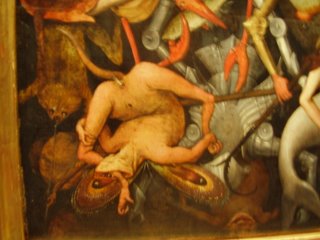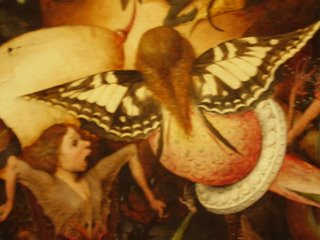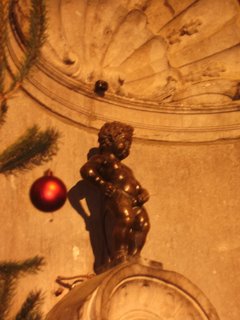A comment on my entry
(un)Intelligent Discussion got me thinking about the intelligent design of hurricanes. I told the commenter that I wasnt aware of any such theory from the media. It turns out that scientists--mainstream scientists--have their own theories of the intelligent design of the entire universe, although I suspect they dont consider themselves ID proponents, or will not admit to being one publicly.
Consider
this article in Slate dated 19 May 2004. Jim Holt interviews Stanford University physicist
Andrei Linde. Linde proposes that it is possible that intelligent beings from another civilization could create a universe.
"When I invented chaotic inflation theory, I found that the only thing you needed to get a universe like ours started is a hundred-thousandth of a gram of matter," Linde told me in his Russian-accented English when I reached him by phone at Stanford. "That's enough to create a small chunk of vacuum that blows up into the billions and billions of galaxies we see around us. It looks like cheating, but that's how the inflation theory works—all the matter in the universe gets created from the negative energy of the gravitational field. So, what's to stop us from creating a universe in a lab? We would be like gods!...What my theoretical argument shows...is that we can't rule out the possibility that our own universe was created in a lab by someone in another universe who just felt like doing it."
Lindt even proposes ways in which this universe creator could communicate with his creation using the language of physics, that is, by designing parameters in the universe that intelligent creatures that might arise in it could decipher from the physical evidence. A sort of clue or code that would tell the 'people' there that this was the work of some intelligent being. From the article:
...the creator, by fixing certain values for these dozens of constants, could write a subtle message into the very structure of the universe. And, as Linde hastened to point out, such a message would be legible only to physicists.
That is exactly what ID biologists are trying to point out: that the very structure of living things point to an intelligent entity who left instructions on how to build living, replicating things. I mentioned irreducible complexity in the comments section, a term coined by biochemist
Michael Behe. He points out that at the biochemical level, a level Darwin wasnt able to observe since the technology didnt exist yet when he was formulating his groundbreaking theory, one would find that processes that makes the cell run for example couldnt have come from a slow, random process, but from a 'conscious' following of an instruction set. The technical stuff of this theory is way over my head, but as I understand it, irreducible complexity can be illustrated thus:
Given a cellular organism with biological processes we'll call ABCDEFG, wherein A,B,C,D,E,F, and G are processes within the overall process, the organism will cease to function if any one of these processes is absent. Pretty simple. The reason Behe concludes that this is evidence for design is that it couldnt have come from a gradual, random process. In the primordial ooze for example, ABCDEG couldnt have survived and propagated long enough to randomly mutate the F process. A couldnt have survived to randomly acquire B, AB couldnt have survived to randomly acquire ABC, etc. And the odds that a random mutation caused A,B,C,D,E,F, and G to come together to build an organism are so large, it's practically impossible. Hence, he concludes that the process was following instructions. ID proponents are simply using accepted scientific methods for determining whether something was designed or not (by, for example the scientists from the
SETI project), and turning them towards terrestrial life.
The thing that irks anti-ID scientists is the idea that ID is providing Creationists a veneer of scientific legitimacy. In fact, most of them accuse ID as being Creationism in disguise, therefore preventing curious scientists from looking into it, fearing
reprisal. ID scientists, in a case of logical double standard, are pilloried for espousing philosophical ideas masquerading as science, while at the same time scientists like
Richard Dawkins are given a pass for espousing equally philosophical ideas (in this case, atheism) even though a scientist's personal philosophy has little to do with the evidence.
I should point out that my view that intelligent design is worthy of investigation is based on logical consistency and not on my understanding of the science involved. I just get my information from the media. If mainstream scientists like Andrei Linde and
Brian Greene believe that
a universe can be designed, why is it not possible for our universe and the life in it to have been designed as well?




